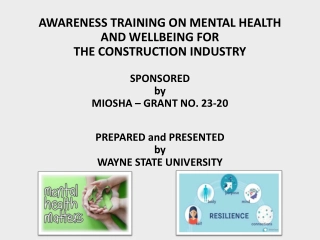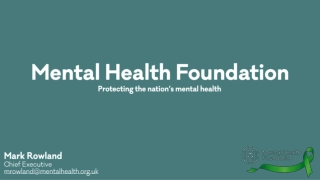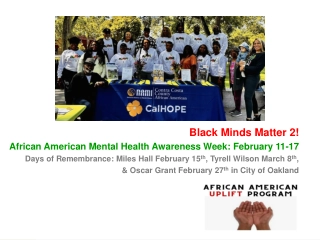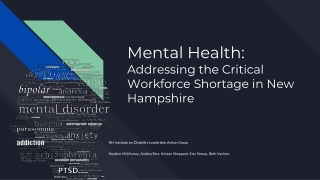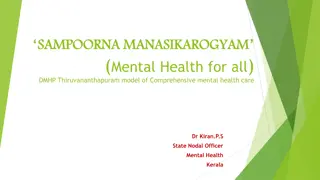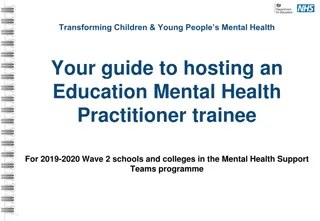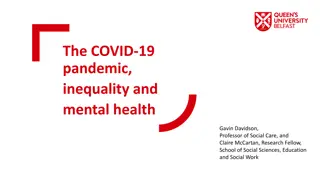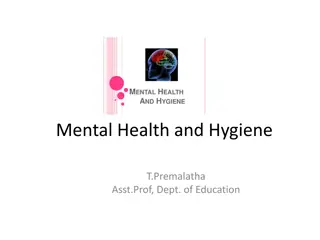Mental Health
Recovery in mental health is a deeply personal journey where individuals define their paths towards a meaningful life. Language plays a vital role in conveying hope, commitment, and support. This content explores recovery-focused language and examples, emphasizing empowerment, autonomy, and the importance of individual experiences in mental health recovery.
Download Presentation

Please find below an Image/Link to download the presentation.
The content on the website is provided AS IS for your information and personal use only. It may not be sold, licensed, or shared on other websites without obtaining consent from the author.If you encounter any issues during the download, it is possible that the publisher has removed the file from their server.
You are allowed to download the files provided on this website for personal or commercial use, subject to the condition that they are used lawfully. All files are the property of their respective owners.
The content on the website is provided AS IS for your information and personal use only. It may not be sold, licensed, or shared on other websites without obtaining consent from the author.
E N D
Presentation Transcript
Mental Health Date
Recovery Recovery - - recap recap Creating hope and building autonomy, to support self-empowerment, whereby the person is supported to define, lead and own their recovery. Recovery is being able to live a meaningful and satisfying life, as defined by each person, in the presence or absence of symptoms. It is about having control over and input into one s own life. Each individual s recovery, like his or her experience of mental health is a unique and deeply personal process. It is important to be clear that there is no right or wrong way to recover. - Scottish Recovery Network Https://www.mentalhealth.org.uk/a-to-z/r/recovery 2
Recovery focused language Recovery focused language Our language conveys our thoughts, feelings, facts and information, but beyond that, we need to be reflective in our practice and ask ourselves questions like: What else am I saying? How will someone else read or hear this? Do I give a sense of commitment, hope and present opportunity or a sense of pessimism? Do I convey an awareness and expectation of recovery? Recovery Oriented Language Guide (mhcc) 3
Breakout discussion 1 Breakout discussion 1 Recovery language Recovery language Uchenna has a Personality Disorder which means she can struggle to make friends but she s really nice once you get to know her. Julie is recovering from an episode of psychosis, she needs a lot of support with her problems. Sami disagrees with his diagnosis. His medication isn t helping him and he would like to explore other options. Sami lacks insight into his mental illness, he s refusing to take his medication. Tom would find it helpful to talk to a peer support worker so that he can talk about his problems. Ritu won t go to the group today she s feeling very paranoid at the moment. Lauren would like to start a college course but she s not ready, she can become very loud and disruptive when with a group of people. Jonah has identified a lack of sleep as a trigger for him. When he sleeps well he feels better and is able to build more effective relationships with others. Jonah becomes very depressed when he doesn t sleep well, he starts to drink and acts inappropriately towards others. Ted won t join a recovery group with you so please don t get your hopes up. Mali has identified some life goals that are very important to her. She is working on strategies to help her achieve these. Mali hears voices, it is something she has to learn to manage for the rest of her life. Vicky is amazing at music but when she becomes manic she has delusions about herself and others. Ben has stopped being concordant with his medication, he will soon relapse and be back in hospital. 4
Recovery language examples Recovery language examples Uchenna has a Personality Disorder which means she can struggle to make friends but she s really nice once you get to know her. Uchenna has a lot to offer to others, but sometimes needs extra support to build new friendships. Julie is recovering from an episode of psychosis, she needs a lot of support with her problems. Julie has had a tough time recently, and would like some extra support. Sami disagrees with his diagnosis. His medication isn t helping him and he would like to explore other options. Sami lacks insight into his mental illness, he s refusing to take his medication. Tom would find it helpful to talk to a peer support worker so that he can talk about his problems. Tom might find it useful to talk to a peer support worker about his experiences. Ritu won t go to the group today she s feeling very paranoid at the moment. Ritu is finding it difficult to socialise at the moment so might not go to the group today. Lauren would like to start a college course but she s not ready, she can become very loud and disruptive when with a group of people. Lauren would like to start a college course, we re working with her to think about how to achieve that. Jonah has identified a lack of sleep as a trigger for him. When he sleeps well he feels better and is able to build more effective relationships with others. Jonah becomes very depressed when he doesn t sleep well, he starts to drink and acts inappropriately towards others. Ted won t join a recovery group with you so please don t get your hopes up. Ted hasn t shown interest in recovery groups in the past, it might be worth asking him why. Mali has identified some life goals that are very important to her. She is working on strategies to help her achieve these. Mali hears voices, it is something she has to learn to manage for the rest of her life. Vicky is amazing at music but when she becomes manic she has delusions about herself and others. Vicky is amazing at music. Ben has stopped being concordant with his medication, he will soon relapse and be back in hospital. Ben is having difficulties with his current medication. We re working with him to explore other options to help him manage at home. 5
Stories Stories Being enabled to tell their own stories in their own words was strongly connected to feeling valued valued and empowered empowered as an individual, as opposed to feeling marginalised, silenced and required to fit into boxes defined by others. Key skills: Listening and understanding: Listening to people s stories no matter how messy or upsetting they might be Allowing people to tell their stories in their own words, in their own way, without having to fit into a pre-defined box Acknowledging that multiple paradigms and interpretations of reality can exist Receiving stories with insight and empathy: present Insight: understanding the impact of past experiences and how they can affect the Empathy: listening with acceptance, respect and validation 6 Engaging with complexity (Centre for Mental Health 2019)
Story telling methods Story telling methods https://www.mindtools.com/pages/article/vak-learning-styles.htm 7
A refresher: reflecting, paraphrasing and summarising A refresher: reflecting, paraphrasing and summarising 8
Breakout discussion 2 Breakout discussion 2 Reflecting and paraphrasing Reflecting and paraphrasing Reflecting: I feel really stuck it feels like everything is going wrong. Everything was going well and then my relationship started to go downhill. I keep telling myself to stay positive but if it wasn t for the children, I think I would leave. No matter how hard I try, I keep hitting dead ends, and I don t know where to turn any more. I feel like such a failure. Paraphrasing: Reflecting: I m feeling really low at the moment. Everything feels like such an effort getting up in the morning and having a shower feels like a mammoth task. When I do manage to get up I feel like I m walking around with a heavy weight on my shoulders. I was supposed to see my mum last week, but I cancelled again she s probably really upset with me. It feels like this is just my life now, it s never going to get any better. Paraphrasing: 9
Breakout discussion 3 Breakout discussion 3 Story telling Story telling Share a story with your partner using one of the story-telling methods discussed choose which ever method you prefer Your story should be: A real story about something that has happened to you personally Something you found difficult or challenging (e.g. a difficult work situation) Something you feel safe and comfortable to share in this context The person listening to the story should listen, ask questions where appropriate, and reflect/ paraphrase/ summarise You will be asked to feedback how you found the exercise, but you won t be asked to share your individual stories. 10
Breakout discussion 4 Breakout discussion 4 Working with diagnosis Working with diagnosis Discuss any advantages or disadvantages of diagnosis. Please nominate a spokesperson for your group who should take notes and feedback to the wider group. 11
Breakout discussion 5 Breakout discussion 5 Working with diagnosis Working with diagnosis Dawn is working with Sadie she has just found out that Sadie has been given a diagnosis of Borderline Personality Disorder . Dawn was given this diagnosis herself several years ago. Facts Dawn believes that she has been treated very badly as a direct result of her own diagnosis. She feels very strongly that BPD is an unhelpful and potentially damaging diagnosis. She assumes that Sadie feels the same. Stories Whenever anyone mentions BPD (by Sadie herself or Dawn s colleagues), Dawn can feel her heart starting to race and her palms get sweaty. Her jaw clenches and her muscles tense. Physical response Dawn feels angry and upset when the diagnosis is mentioned. She also feels a strong sense of connection to Sadie (affinity bias). Emotions Dawn looks for evidence in her conversations with Sadie that she is similarly frustrated about the diagnosis (confirmation bias) she takes these to her supervisor and other members of the team to push back on the diagnosis. She has challenged colleagues on a number of occasions about this, and has been given feedback that her tone and approach comes across as being aggressive in these situations. Behaviour What s going on for Dawn? What are the potential implications for Dawn? How might this impact on how Sadie is supported? What should Dawn do? Please nominate a spokesperson for your group who should take notes and feedback to the wider group. 12
Breakout discussion 6 Breakout discussion 6 Buddy catch up Buddy catch up Identify a situation in work where it might be helpful to spend more time exploring an individual s story and language How might you apply some of the learning from today? What would success look like? 13


